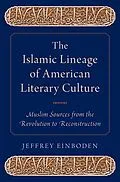Uncovering Islam's little known yet formative impact on U.S. literary culture, this book traces genealogies of Islamic influence that span America's earliest generations, reaching from the Revolution to Reconstruction. Excavating personal appeals to Islam by pioneering national authors-Ezra Stiles, William Bentley, Washington Irving, Lydia Maria Child, Ralph Waldo Emerson-Einboden discovers Muslim discourse woven into the familiar fabric of unpublished letters and sermons, journals and journalism, memoirs and marginalia. The first to unearth multiple manuscripts exhibiting American investment in Middle Eastern languages and literatures, Einboden argues that Islamic precedents helped to prompt and propel creativity in the young Republic, acting as vehicles of artistic reflection, religious contemplation, and political liberation. Intersecting informal engagements and intimate exchanges, Islamic sources are situated in this timely study as catalysts for American authorship and identity, with U.S. writers mirroring the defining struggles of their country's first decades through domestic investment in the Qur'an, Hadith, and Persian Sufi poetry.
Autorentext
Jeffrey Einboden is Associate Professor of English at Northern Illinois University.
Inhalt
Acknowledgements Introduction Chapter 1: "Blessed Be Allah, Most Fair": Ezra Stiles's Arabic Revolutions Chapter 2: "I most sincerely wish an Arabic Manuscript of the Koran": William Bentley's Islamic Archives Chapter 3: "Intermingled with texts of the Koran": Washington Irving's Moorish Renovations Chapter 4: "To look at the Koran through his spectacles": The Muslim Progress of Lydia Maria Child Chapter 5: "He knows the Koran by heart": The Sufi Circulations of Ralph Waldo Emerson Appendix Notes Bibliography Index
